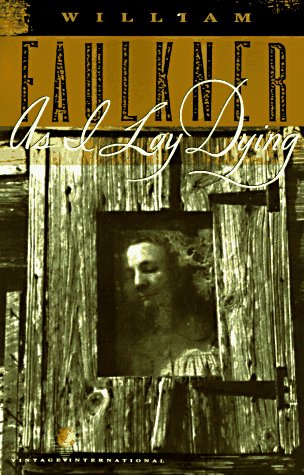For those of you who have not read As I Lay Dying, I would highly recommend it. William Faulkner is absolutely brilliant, although I have a preference, as he writes primarily about those of the South. Do not be fooled by the title. This is not some macabre, cheap-angst, existential story. This is an incredibly rich, layered, and calculated presentation of the psyche of a family. Not to mentioned its often listed as one of the best works of American fiction. Ever.
Published in 1930, the book tells the story in a sort of disjunctive fashion, changing viewpoints every chapter to create a quilt of a whopping 59 chapters, and 15 different perspectives. The story traces the journey of the Bundren family after their mother's death, and their attempt to transport her coffin across the county to her intended burial grounds.
Below are some of my favorite quotes. Some really resonate with me, and others are simply beautiful. I intend to read the book again in the near future so that I can rake the pages for more significance this time, unhindered by a search for plot and cohesiveness. Also, I put the page numbers, which I only just realized is completely useless unless you read the exact edition that I did. Regardless, in any publication, the page number should get you to right around where it would be normally, should you desire to read direct source. I have also put the narrator to each given chapter next to each quote, which would the add to the phrase's intent and comprehension:
p.38, Vardaman: “I am not crying now. I am not anything. Dewey Dell comes to the hill and calls me. Vardaman. I am not anything. I am quiet.”
p.41, Dewey Dell: “I feel my body, my bones and flesh beginning to part and open upon the alone, and the process of coming unalone is terrible.”
p.42, Dewey Dell: “I feel like a wet seed wild in the hot blind earth.”
p.93, Darl: “…he and I look at one another with long probing looks, looks that plunge unimpeded through one another’s eyes and into the ultimate secret place where for an instant Cash and Darl crouch flagrant and unabashed in all the old terror and the old foreboding, alert and secret and without shame. When we speak our voices are quiet, detached.”
p.117, Addie: “And then he died. He did not know he was dead. I would lie by him in the dark, hearing the dark land talking of God’s love and His beauty and His sin; hearing the dark voicelessness in which the words are the deeds, and the other words that are not deeds, that are just the gaps in people’s lacks, coming down like the cries of geese out of the wild darkness in the old terrible nights, fumbling at the deeds like orphans to whom are pointed out in a crowd two faces and told, That is your father, your mother.”
p.140, Darl: “If you could just ravel out into time. That would be nice. It would be nice if you could just ravel out into time.”
p.153, Darl: “The back of Jewel’s shirt, where it touches him, stains slow and black with grease. Life was created in the valleys. It blew up onto the hills on the old terrors, the old lusts, the old despairs. That’s why you must walk up the hills so you can ride down.”
p.157, Cash: “Sometimes I aint so sho who’s got ere a right to say when a man is crazy and when he aint. Sometimes I think it aint none of us pure crazy and aint none of us pure sane until the balance of us talks him that-a-way. It’s like it aint so much what a fellow does, but it’s the way the majority of folks is looking at him when he does it.”

No comments:
Post a Comment